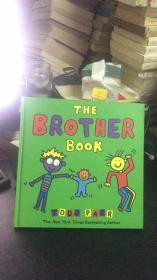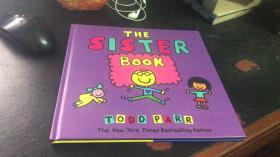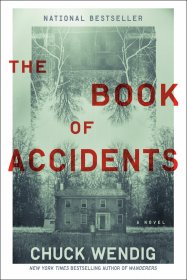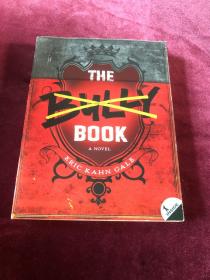
【预订】The Book of Accidents
书籍内容简介可联系客服查阅,查书找书开票同样可以联系客服
¥ 88 ¥ 88 九五品
仅1件
作者Chuck Wendig
出版社Random House Worlds
ISBN9780399182150
出版时间2022-03
装帧平装
定价88元
货号YB-86080
上书时间2024-06-28
- 最新上架
商品详情
- 品相描述:九五品
- 商品描述
-
商品简介
NATIONAL BESTSELLER • A family returns to their hometown—and to the dark past that haunts them still—in this masterpiece of literary horror by the New York Times bestselling author of Wanderers
LOCUS AWARD FINALIST • “The dread, the scope, the pacing, the turns—I haven’t felt all this so intensely since The Shining.”—Stephen Graham Jones, New York Times bestselling author of The Only Good Indians
ONE OF THE BEST BOOKS OF THE YEAR: The New York Public Library, Library Journal
Long ago, Nathan lived in a house in the country with his abusive father—and has never told his family what happened there.
Long ago, Maddie was a little girl making dolls in her bedroom when she saw something she shouldn’t have—and is trying to remember that lost trauma by making haunting sculptures.
Long ago, something sinister, something hungry, walked in the tunnels and the mountains and the coal mines of their hometown in rural Pennsylvania.
Now, Nate and Maddie Graves are married, and they have moved back to their hometown with their son, Oliver.
And now what happened long ago is happening again . . . and it is happening to Oliver. He meets a strange boy who becomes his best friend, a boy with secrets of his own and a taste for dark magic.
This dark magic puts them at the heart of a battle of good versus evil and a fight for the soul of the family—and perhaps for all of the world. But the Graves family has a secret weapon in this battle: their love for one another.
全国畅销书•在《纽约时报》畅销书《流浪者》作者的这部恐怖文学杰作中,一家人回到了家乡—回到了仍然困扰着他们的黑暗过去—
LOCUS 奖入围者 • “恐惧、范围、节奏、转折——自从《闪灵》以来,我从未如此强烈地感受到这一切。”——史蒂芬·格雷厄姆·琼斯,《纽约时报》 畅销书《唯一的好印第安人》作者
年度最佳图书之一:纽约公共图书馆,图书馆杂志
很久以前,内森和他虐待他的父亲住在乡下的一所房子里—并且从未告诉他的家人那里发生了什么事。
很久以前,麦迪还是一个在卧室里制作洋娃娃的小女孩,当她看到一些她不应该看到的东西时,她试图通过制作令人难以忘怀的雕塑来记住失去的创伤。
很久以前,有一些邪恶的东西,一些饥饿的东西,在他们家乡宾夕法尼亚州乡村的隧道、山脉和煤矿中行走。
现在,内特和麦迪·格雷夫斯结婚了,他们带着儿子奥利弗搬回了家乡。
现在,很久以前发生的事情又再次发生了。 。 。而这种事正在发生在奥利弗身上。他遇到了一个奇怪的男孩,他成为了他最好的朋友,一个有自己的秘密并且喜欢黑魔法的男孩。
这种黑暗魔法使他们处于善与恶之战的中心,并为家庭的灵魂而战——也许是为了全世界。但格雷夫斯家族在这场战斗中拥有一个秘密武器:他们对彼此的爱。
作者简介
Chuck Wendig is the New York Times bestselling author of Wanderers, Star Wars: Aftermath, the Miriam Black thrillers, the Atlanta Burns books, and Zer0es and Invasive, alongside other works across comics, games, film, and more. He was a finalist for the Astounding Award for Best New Writer and an alum of the Sundance Screenwriters Lab, and he served as the co-writer of the Emmy-nominated digital narrative Collapsus. He is also known for his popular blog, terribleminds, and books about writing such as Damn Fine Story. He lives in Pennsylvania with his family.
精彩内容
1
Tinnitus
This was Oliver:
The boy, fifteen, knelt on the ground, his chin against his chest, the soft undersides of his forearms pressing into his ears even as his fingers dug into the thatch of messy hair at the back of his head. His ears rang sharply—not the tolling of a bell but a shrill whine, like that of a dental drill. To one side of him: yellow lockers. To the other: a water fountain. Above: a waterfall of bright fluorescence. Somewhere ahead were two gunshots, bang, bang. Each made his heart jump. Somewhere behind him were the murmur and rustle of students moving from classroom to classroom, seeking safety. Oliver imagined them dead. He imagined his teachers dead. Blood on linoleum. Brains on chalkboard. He imagined weeping parents on the news, and the suicides of survivors, and the thoughts and prayers of uncaring politicians—he could see the pain like a little ripple that became a wave, that met other waves and became tsunamis roaring back and forth over people until all were drowned underneath.
A hand grasped his shoulder and shook him. A word spoken as if through a fishbowl—his name. Someone was saying his name. “Olly. Oliver. Olly!” He gently rocked himself back on his ankles, sitting partly upright. It was Mr. Partlow, his BioSci teacher. “Hey. Hey, lockdown drill’s almost over, Oliver. You okay? Come on, kiddo, let’s get you—”
But then the teacher let go and took a half step back. Mr. Partlow stared down at the floor—no, not at the floor. At Oliver. Oliver took a look, too. His crotch was wet. Fingers of liquid were spreading down his pant legs. Ahead, he saw a few students gather and stare. Landon Gray, who sat behind him in homeroom, looked sad. Amanda McInerney—who was in all the plays, and chorus, and student council—made a gross face and giggled.
Mr. Partlow helped him stand up and took him away. Oliver wiped tears from his face, tears he didn’t even know he’d spilled.
2
The Lawyer
This was Nate:
That same day, Nate sat in a lawyer’s office in Langhorne. The lawyer was round and grub white, like the inside of a cut potato. In the window of the office, an AC unit grumbled and growled, so that the man had to raise his voice in order to be heard.
“Thank you for coming,” the lawyer, Mr. Rickert, said.
“Uh-huh.” Nate tried to keep his hands from balling into fists. Tried, and failed.
“Your father is sick,” the lawyer said.
“Good,” Nate answered without hesitation.
Rickert leaned forward.
“It’s cancer. Colon cancer.”
“Fine.”
“He’ll be dead soon. Very soon. He’s on hospice.”
Nate shrugged. “Okay.”
“Okay,” the lawyer repeated, and Nate couldn’t tell if the man was surprised by his reaction—or prepared for it. “Mr. Graves—”
“I know you expect me to be broken up about all this, but I’m not. Not one little bit. My father was—or, is, I guess—a tremendous piece of garbage. I have no love for him. I have only hatred and disdain for that monster masquerading as a man, and truth be told, I’ve been dreaming of this day for the better part of twenty years, maybe longer. I’ve imagined how it would go. I’ve prayed to whatever god that would listen that my father, the piece of shit that he is, would go painfully and miserably, that it wouldn’t be fast, wouldn’t be a quick sprint to the end, but, rather, a slow, stumbling marathon, a . . . a clumsy run where he’s painting the walls with his lung blood, where he’s drowning in his own fluids, where he’s gotta wear some, some bag on his side to contain his own f—his own mess, a bag that breaks on him or that pops out of its port every time he moves to adjust his ruined, dying body. You know what? I was hoping it’d be cancer. A crawling, steady cancer, too, not fast like pancreatic. Something that eats him up from the inside sure as he ate up our family. Cancer for cancer, tit for tat. I figured it’d be lung, given the way he smoked. Or liver, given the drink. But colon cancer? I’ll take colon. He was . . . he was always full of shit, so that is a fitting end for that semi-human sack of septic excrement.”
The lawyer blinked. Silence passed between them. Rickert pursed his lips. “Are you done monologuing?”
“Go to hell.” He paused, regretting being so angry at this man who probably didn’t deserve it. “Yes, I am.”
“Your speech doesn’t surprise me. Your father said you’d say those things.” He laughed a little, a high-pitched titter, and he gesticulated with both hands so it looked like his fingers were little moths taking flight. “Well, not those things, exactly. But the gist.”
“So, what’s the point? Why am I here?”
“Your father, before he passes, wants to offer you a deal.”
“No deal, whatever it is.”
“It’s a favorable deal for you. Don’t you want to hear it?”
“I don’t.” Nate stood up, kicking the chair out behind him. It juddered louder and more aggressively than he’d intended it, but it was what it was and he wouldn’t apologize.
He turned to leave.
“It’s the house,” the lawyer said. Nate’s hand paused on the doorknob.
“The house.”
“That’s right. Your childhood home.”
“Great. He can leave it to me in the will.”
“It’s not in the will. He will sell the house to you, instead. The house, and the thirteen acres of land on which it sits.”
Nate shrugged. “Sorry. I can’t afford it.” The house—as the lawyer noted, Nate’s childhood home—was in an area that had, over the decades, become prime real estate. Upper Bucks County. Used to be just farmland and swamp, but these days, prices were up, taxes were up, rich people had moved in from Philly or New York. Gentrification wasn’t just for the inner cities. “Tell him to sell it, then. He can use the money to pay for a really fantastic casket.”
“Surely you can afford the cost of a single dollar.”
Nate turned his narrowed gaze toward Rickert. He ran a hand through his beard and winced. “A dollar.”
“A dollar, that’s right.”
&ld
相关推荐
-

【预订】The Brother Book
九品北京
¥ 100.00
-

【预订】The Sister Book
九品北京
¥ 100.00
-

【预订】The Book of Accidents
九五品成都
¥ 88.00
-

【预订】The Book of Accidents
九五品广州
¥ 88.00
-

【预订】The Book of Accidents
九五品广州
¥ 88.00
-

【预订】The Book of Accidents
九五品济南
¥ 88.00
-

【预订】The Bully Book A Novel
九品周口
¥ 260.00
-

【预订】The Spy's Bedside Book
九五品成都
¥ 78.00
-

【预订】The Spy's Bedside Book
九五品广州
¥ 78.00
-

【预订】The Spy's Bedside Book
九五品济南
¥ 78.00
— 没有更多了 —












以下为对购买帮助不大的评价